How will the coronavirus change sports?
The return of sports has begun, more than four months since they were shut down amid the novel coronavirus pandemic, highlighted by Major League Baseball, the WNBA and Thursday night’s highly anticipated resumption of the NBA season inside the Disney World bubble.
But this week’s coronavirus outbreak within the Miami Marlins, which forced the cancellation of a handful of MLB games, served as a sober reminder of the challenges facing every sports organization, and as NFL training camps opened within the last few days, several players have chosen to sit out the season rather than risk contracting the virus while playing.
What will be the long-term impacts of the pandemic on the sports world? We asked several of our sports reporters and columnists to give their predictions, and their answers ranged from a new model for collegiate sports to increased risks among football players.

Sally Jenkins, columnist
Less corruption and fewer middlemen
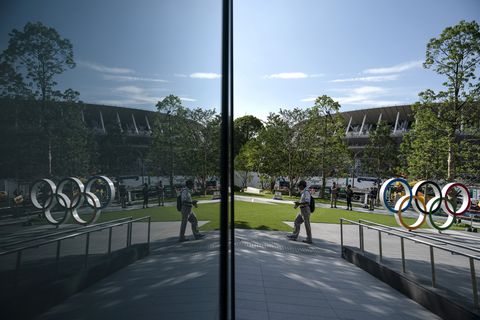 The novel coronavirus pandemic will change the way the Olympics operate in many ways, some for the worse and some for the better. (AP Photo/Jae C. Hong, File)
The novel coronavirus pandemic will change the way the Olympics operate in many ways, some for the worse and some for the better. (AP Photo/Jae C. Hong, File) It’s almost incalculable how much the pandemic will change things. First of all, the risk posed by large crowds at international gatherings will downsize if not kill the Olympics as a mass spectator event and building project, which is sad but will eliminate a lot of graft. Second, it will dramatically reduce the size of college athletic departments and by extension further diminish the Olympic movement, also eliminating graft as well as bloat.
So-called amateur athletes will suffer funding losses initially, but my hope is new models will arise that cut out some of the administrative middlemen. Some sports won’t survive. Some will return to their club roots.
Read more by Sally Jenkins

Robert Klemko, investigative reporter
More risks for athletes and the possibility of a sudden death
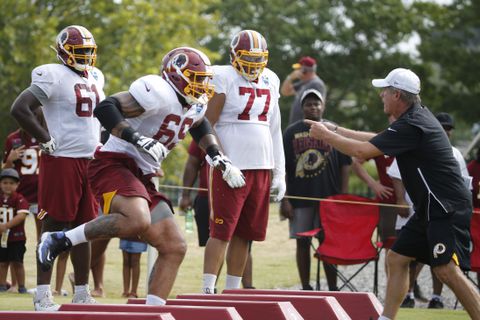 The NFL has more players than any other American sport whose size and weight make them vulnerable to the effects of the novel coronavirus. (AP Photo/Steve Helber, File)
The NFL has more players than any other American sport whose size and weight make them vulnerable to the effects of the novel coronavirus. (AP Photo/Steve Helber, File) The NFL’s refusal to classify players with a body mass index (BMI) over 30 as part of the at-risk group vulnerable to the novel coronavirus, as the CDC has done, is very telling. In denying opt-out benefits to that group that the league has extended to others, the NFL is tacitly acknowledging what we already know: A larger portion of its workforce fits into the at-risk category than that of any other major North American sport. It’s not difficult to imagine a scenario where one of the many offensive or defensive linemen in the at-risk group falls seriously ill or dies. Then what?
The impact of repeated concussions is a slow burn that takes effect outside the view of the public (for the most part). But a coronavirus death will be sudden and public. The reaction of fans – and the NFL – to such a tragedy will be telling.
Read more by Robert Klemko

Liz Clarke, Olympics and tennis reporter
Sports without spectators?
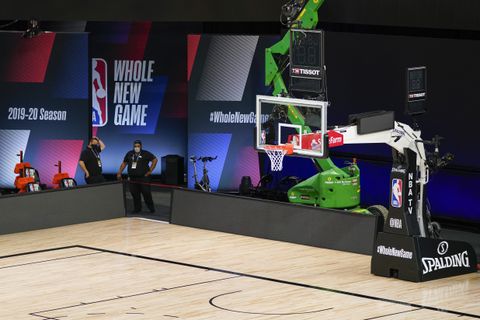 The fan experience of attending games will be altered in many ways, and perhaps for years to come, by the novel coronavirus pandemic. (AP Photo/Ashley Landis)
The fan experience of attending games will be altered in many ways, and perhaps for years to come, by the novel coronavirus pandemic. (AP Photo/Ashley Landis) It’s so difficult to predict the impact of the coronavirus on the future of sports because the ground beneath every aspect of this question shifts almost daily and in seismic fashion.
In terms of sports themselves, I think we’re seeing that those sports with a degree of inherent social distancing — auto racing, tennis to a certain extent — will be impacted far less than contact sports that are so popular in the United States, football tops among them.
In terms of the broader impact, I think many overlook the question of how the coronavirus will affect the fan “experience.” At what point, if ever, will it be safe or prudent to pack 20,000-seat arenas with screaming fans for college basketball or NBA games? What about football stadiums? The grandstands at Daytona International Speedway? It may be that for a long time, sports become entertainment that’s only offered via TV and not staged for spectators in the stands.
Read more by Liz Clarke

Adam Kilgore, national sports reporter
Amateurs with more negotiating power and owners who might sell
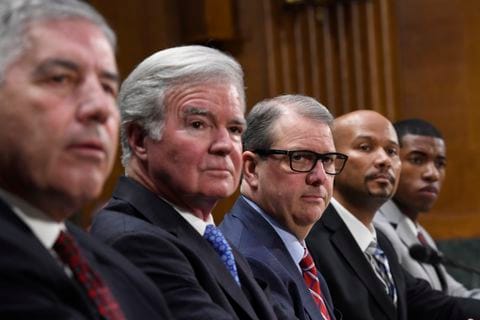 The pandemic will force NCAA President Mark Emmert, second from left, and college administrators, along with the owners of professional sports teams, to face some harsh financial realities. (AP Photo/Susan Walsh, File)
The pandemic will force NCAA President Mark Emmert, second from left, and college administrators, along with the owners of professional sports teams, to face some harsh financial realities. (AP Photo/Susan Walsh, File) The effects of the novel coronavirus pandemic will change sports in myriad ways, and two of those ways show how far-ranging they will be.
The collegiate sports model could be completely upended — as athletes see a real-world example of how much value their performance holds, they will be more empowered to demand compensation.
And in professional sports, the financial hit could lead to a moderate shakeup in ownership — team owners who lack financial fluidity, either in their sports ownership or other business ventures, may be hard-pressed not to sell and reap the immediate financial boost.
Read more by Adam Kilgore

Mark Maske, NFL reporter
Curious about football? Look at MLB.
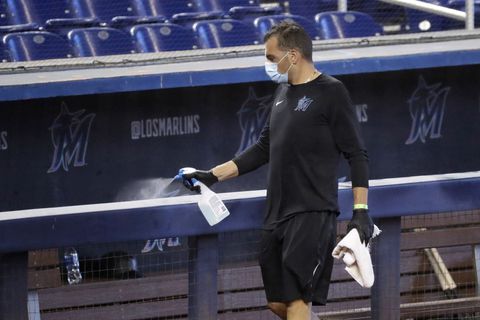 Major League Baseball and the NFL are the two major American sports leagues attempting to play during the pandemic without using some type of bubble format. The NFL saw just how difficult pulling off its season will be when baseball had to cancel games and halt some teams’ schedules after a coronavirus outbreak ravaged the Miami Marlins just days into the season. (AP Photo/Wilfredo Lee, File)
Major League Baseball and the NFL are the two major American sports leagues attempting to play during the pandemic without using some type of bubble format. The NFL saw just how difficult pulling off its season will be when baseball had to cancel games and halt some teams’ schedules after a coronavirus outbreak ravaged the Miami Marlins just days into the season. (AP Photo/Wilfredo Lee, File) NFL teams have begun opening their training camps fully. But the path forward is very uncertain as Allen Sills, the league’s chief medical officer, said he remains cautiously optimistic about the season but he knows that “this will be hard.”
The NFL decided against a single-site bubble plan like the NBA is doing. The closest comparison to the NFL’s approach is Major League Baseball’s, and things in MLB aren’t looking particularly promising right now.
Read more by Mark Maske

Jerry Brewer, columnist
A rough decade for pro sports, and a new model for college athletics
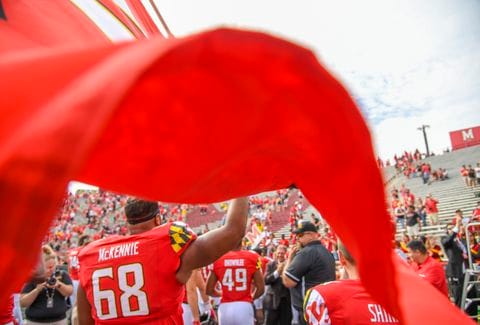 The pandemic will change the way college athletic departments do business and force campus leaders to reckon with athletes who feel more empowered to ask for a fair share of the financial pie and for more say over their own welfare. (Jonathan Newton / The Washington Post)
The pandemic will change the way college athletic departments do business and force campus leaders to reckon with athletes who feel more empowered to ask for a fair share of the financial pie and for more say over their own welfare. (Jonathan Newton / The Washington Post) At minimum, the impact on sports will be devastating for several years to come. If the leagues don’t start playing the long game, the damage of this pandemic could cause a widespread change to sports as we know them.
The financial model of college sports must change, and after going through this, athletes are going to push more than ever for both a cut of those finances and some kind of voice in key decision-making processes. Established pro sports leagues are going to have a rough decade, and those still trying to gain footing are at risk of being forced to shut down. The adjusted viewing habits of fans and their willingness to spend money on tickets to games, even after there is a coronavirus vaccine, is a critical thing to keep an eye on. The money will follow — or dry up, in some cases — according to their changing tastes.
Sports feast on tradition and a kind of intrinsic passion that seldom is in danger of dissipating. This allows them to build their businesses with almost blind optimism. In this situation, it’s wise to be more pessimistic and strategic in finding a better way to exist.
Read more by Jerry Brewer

Kent Babb, feature writer
Smaller stadiums and a new way to celebrate
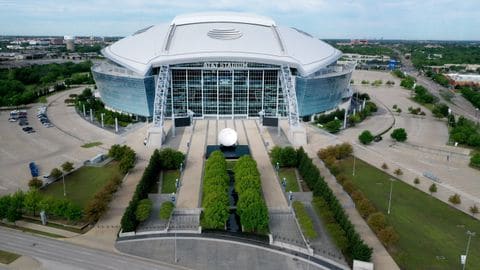 The 105,000-seat AT&T Stadium, home of the Dallas Cowboys, cost well over $1 billion. Going forward, however, professional teams and colleges might shy away from building mammoth venues if fans are uneasy about returning to fill them in a post-pandemic world. (Tom Pennington/Getty Images)
The 105,000-seat AT&T Stadium, home of the Dallas Cowboys, cost well over $1 billion. Going forward, however, professional teams and colleges might shy away from building mammoth venues if fans are uneasy about returning to fill them in a post-pandemic world. (Tom Pennington/Getty Images) It may be a long time before some fans feel comfortable sitting in a crowd again, and as stadiums have gotten bigger and bigger over the years, it’s possible that trend will change because college administrators (and boosters) and professional team executives hate seeing empty seats. Has the trend of 100,000-seat mega-stadiums crested, considering the costs of maintaining them? NFL teams have big television contracts, but the overwhelming majority of college programs don’t. How can you justify greenlighting a stadium expansion if you can’t be certain it’ll ever be full again?
If nothing else, the coronavirus — and how we’re shaped by this historic moment — could spell the death of the handshake, and with that the high-five. Somehow the elbow bump doesn’t feel quite right after a game-winning touchdown, but who’ll want to slap a total stranger’s hand after this?
Read more from Kent Babb

Steven Goff, reporter
Some soccer clubs may collapse
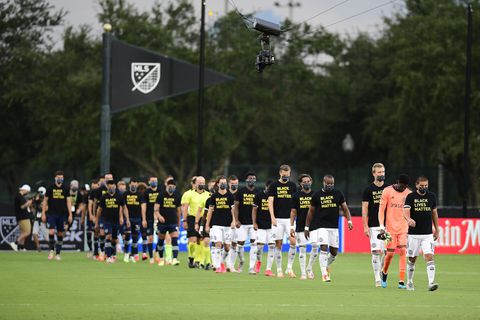 MLS successfully resumed its season with a month-long tournament this summer, as did the NWSL, and several European leagues concluded their campaigns. But the financial strains caused by the novel coronavirus pandemic will be felt by professional soccer leagues around the world for years. (Emilee Chinn/Getty Images)
MLS successfully resumed its season with a month-long tournament this summer, as did the NWSL, and several European leagues concluded their campaigns. But the financial strains caused by the novel coronavirus pandemic will be felt by professional soccer leagues around the world for years. (Emilee Chinn/Getty Images) U.S. soccer’s first-tier leagues adapted to the moment, creating bubbles in Utah (NWSL) and Florida (MLS) for month-long tournaments. Early scares gave way to healthy experiences. Business challenges await, however.
Without a lucrative TV contract, MLS relies heavily on game-day revenue. The fan absence will sting financially. The big European leagues have returned without incident, but they’re playing in empty stadiums, too. The economic fallout in global soccer will punish the transfer market and push some clubs toward insolvency.

Candace Buckner, reporter
Limited access might be here to stay
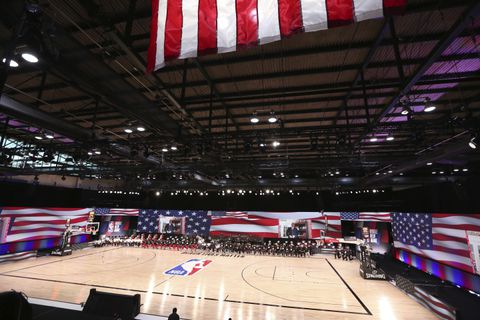 Will the limited access the media has to athletes, such as the NBA players inside the league’s Florida bubble, remain in place even after the pandemic? (Kim Klement/Pool Photo via AP)
Will the limited access the media has to athletes, such as the NBA players inside the league’s Florida bubble, remain in place even after the pandemic? (Kim Klement/Pool Photo via AP) Teams and leagues have limited media access as sports have returned, and understandably so. However, I think this current model of media access for sports coverage — virtually, with reporters having little to no face-to-face contact with the players and coaches — will have an unfortunate, lingering impact on credentialed journalists.
Most fans probably don’t care if sports reporters have access that’s essential to their job, but the quality and nuance of sports journalism will suffer.






